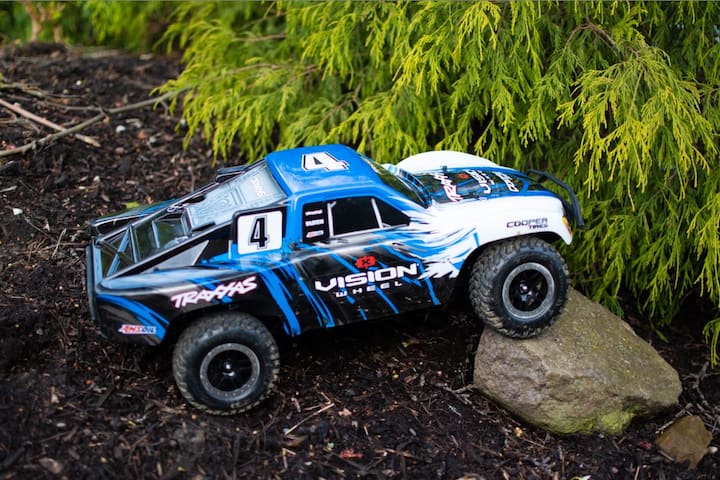
* This post contains affiliate links, and we will be compensated if you buy after clicking on our links.

Driving RC cars, buggies, and monster trucks are one of my favorite hobbies. I take a car with me everywhere I go. RC cars are great to take on road trips, to a friend’s house, or your local race track. You can drive RC cars almost anywhere, and they always get attention from everyone nearby. This is the ultimate beginner guide to RC cars!
RC cars teach you about electronics, batteries, drive trains, and shock absorbers. They are also great for hand-eye coordination.
Most importantly, RC cars are fun. RC is a hobby you can share with your family and friends or yourself if you need some “me time.”
This page is all about what it’s like to dive into the world of RC vehicles. This post won’t cover exactly what car you should get. Instead, I wanted to share general information about researching, buying, driving, and maintaining your first car.
Click the icons below to learn about each part on an RC car:
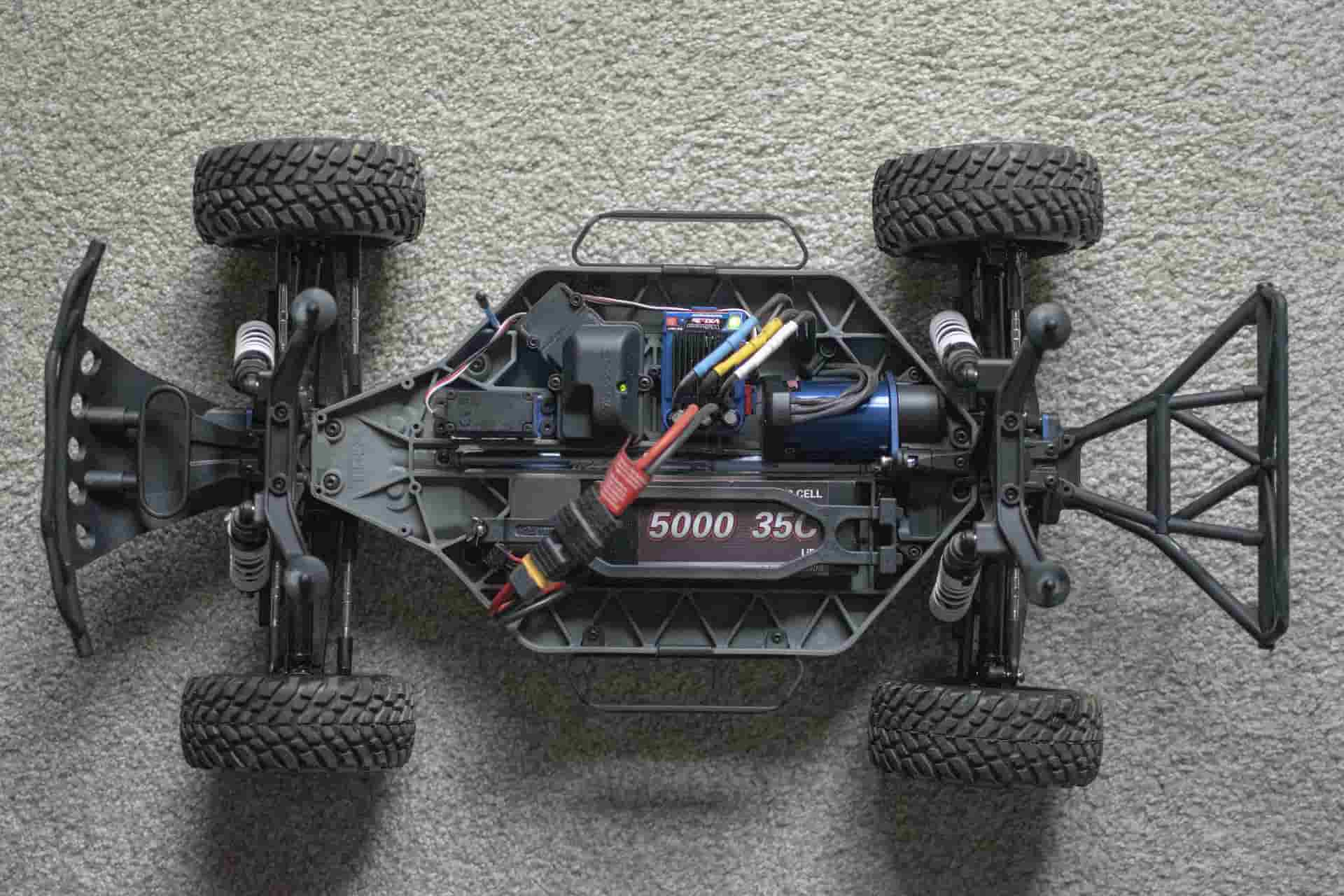
I was a little overwhelmed when I bought my first car in 2013. I walked into Hobby Town in Katy, Texas, and saw a wall of cars. I got really nervous for some reason.
I immediately turned down a random aisle and browsed model trains, balsa wood airplanes, and some strange action figures I had never heard of.
After a few minutes, the shop owner talked to me about RC cars. He asked, “Well, how fast do you want to go?” I had no idea how fast RC cars could go, so I said, “FAST!”.
Over the next thirty minutes, we talked about two-wheel drive cars, four-wheel drive cars, electric vs. nitro engines, and everything in between.
I did not buy a car that day, and I quickly realized I had some homework to do. I went home and fired up my laptop to research everything we discussed.
Fast forward one week, and I was the owner of a brand new Traxxas Slash two-wheel-drive stadium truck!
Fast forward nine more years, and I own drones, helicopters, and planes. I love everything RC!
First and foremost, don’t get nervous on your first trip to the hobby shop like me. Hobby shop people are the kindest folk on the planet. Ask a bunch of questions your first time in the hobby shop.
You can always start small and work your way up to hobby-grade RC cars, AKA pro-level cars.
You can either buy a car with an electric motor and rechargeable batteries or a car with a nitro-powered combustion engine.
I wrote this guide for people looking to buy their first RC car and focus more on electric motors. Most modern RC cars are electric. But, you should know that there are many nitro cars on the market, too.
Nitro cars use a small engine to power car’s drive train.
Electric RC cars and monster trucks get their power from a battery and are equipped with brushed or brushless motors. Electric motors are better suited for beginners because they are reliable and easy to use.
An entry-level RC car isn’t a piece of junk, but the vehicle’s components are not top of the line. If you fall in love with RC cars like me, you can always upgrade your car with high-performance parts like brushless motors, controllers, and shocks.
Generally speaking, an entry-level car will come equipped with:
I would suggest going into a hobby shop and learning about reputable brands. Many cheap brands on the market are a waste of money.
You can expect to spend anywhere from 75 to 250 dollars on an entry-level rig.
A mid-level RC car will have better motors, shocks, and hardware. If you have been driving RC cars for a while, you will instantly feel the difference an extra 100 dollars make when comparing an entry-level to a mid-level RC car.
Mid Level RC cars will come equipped with:
The battery and chargers are generally not included with mid-level cars, but some brands might still have some. The big bonus to a mid-grade RC car will be the brushless motor and ESC that can handle lithium polymer (lipo) batteries.
You can expect to spend between 300 and 450 dollars on a mid-level rig.
A hobby-grade RC car (pro-level) will come with the best parts, motors, and electronics. Or, it might be a bare-bones kit, and you have to buy all the parts separately.
Expert Level RC cars will come equipped with:
you can expect to spend 500 dollars and up for an expert-level RC rig.
Hobby-grade RC cars will come with more metal parts, possibly a carbon fiber chassis, a brushless motor ready for LiPo batteries, and adjustable components.
Adjustable suspension is a nice feature because you can tighten or loosen your shocks with a quick twist of the shock.
Entry-level cars will come equipped with more plastic parts and most likely will have a brushed motor onboard, and they will not typically have any adjustable parts.
Titanium, aluminum, and carbon fiber reduce weight and increase the durability of your car. If you are racing the car and hitting jumps, you want the car to be solid and fast.
Sometimes though, plastic parts will flex and give more than metal parts. Many trucks made for racing and jumping do have plastic parts. So, plastic isn’t necessarily a bad thing.
Your driving style will tell you what type of components you need. If you constantly snap the plastic suspension arms on your car or truck, it’s time to upgrade.
Parts that break regularly should be upgraded to a strong material.
If you are serious about driving and racing RC cars, spend the extra money and purchase a mid-level or pro-level rig.
For example, adjustable shock upgrades for a Traxxas Slash can run you 60 to 90 dollars for the set. Should you spend the extra money on a higher-quality vehicle now or later? It all depends on what type of RC enthusiast you want to be.
RC vehicles come in a variety of sizes and are built for driving on specific terrains. On-road cars are built for extreme speeds, while off-road cars are built to power through tough terrain.
When you are shopping for your first car, think about where and how you want to drive it.
Let’s dive into the major types of RC cars!
Short course trucks are designed after full-size racing trucks. The Traxxas Slash is one of the most popular trucks on the market and is a perfect example of a short course truck.
This type of truck can reach speeds of 60 miles per hour, go off-road, hit jumps, and compete on the race track. It comes in two-wheel drive and four-wheel drive variations.
My first truck was a Slash and I own a 2022 model today. Trust me, this truck can take a beating!
The term “short course truck” is used to describe the truck’s style. It isn’t less durable or slower than other trucks.
If you have the money, I think a short course truck is a great first-time RC car.

RC stadium trucks are typically electric and a little smaller in scale. Most stadium trucks are 1/10 or 1/12 scale and are two-wheel drive, but come in four-wheel drive variations too. I think a Traxxas Rustler is a great example of a stadium truck.
This type of vehicle is fast, can hit jumps, and take a beating. They are great for off-road terrains and do well on the pavement.

RC buggies are one of the best RC cars for beginners. They are fast, nimble, can hit large jumps, and can drive off-road. They come in a variety of sizes, but the most popular sizes are a 1/8 and 1/10 scale. They look like a full-size desert-style buggy you have probably seen on Redbull TV. A great buggy is the Arrma Typhon 4X4.
If you want to drive on the pavement and in the dirt, you won’t be disappointed with a buggy.

A Truggy is a mix between a truck and a buggy. It is essentially a buggy with a truck frame. A truggy is used for off-road racing and almost always is four-wheel drive.
The Losi 1/8 Scale Mini-T is a great first Truggy.
A truggy has larger wheels and tires, a longer driveshaft, arms, and chassis, and will have a body that covers up the chassis and shock towers. I think a Truggy has a sleek, but beefy look to it, while a buggy looks like the RC car from Toy Story.
A buggy will usually have exposed shocks and suspension components.
If you are on the fence between a buggy and a truggy, get a buggy as your first RC car. Truggies are more advanced cars with more components and parts to maintain.
However, truggies look really cool! This truggy by Arrma is a low-profile beast of an RC!

Did you ever go to a monster truck rally as a kid? Well, RC monster trucks look just like real-life monster trucks like the Grave Digger.
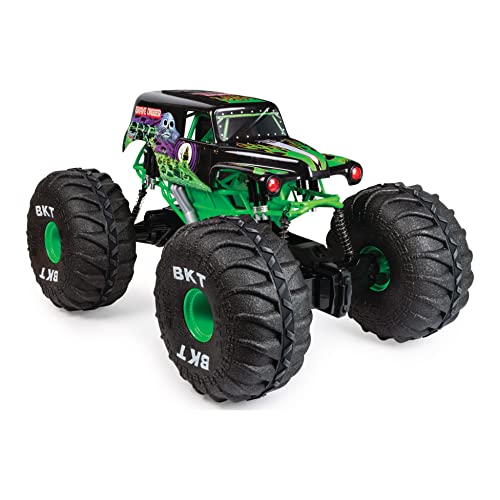
The Traxxas Stampede is an AWESOME monster truck that has an affordable price.
They have big shocks with impressive ground clearance. They come in two-wheel drive and four-wheel drive variations and are perfect for off-road driving.

You can crush matchbox cars and set up a fun course for your truck right in your backyard.
One of the downsides to a monster truck is they tend to tip over easily and they are not as fast as a buggy or truggy.
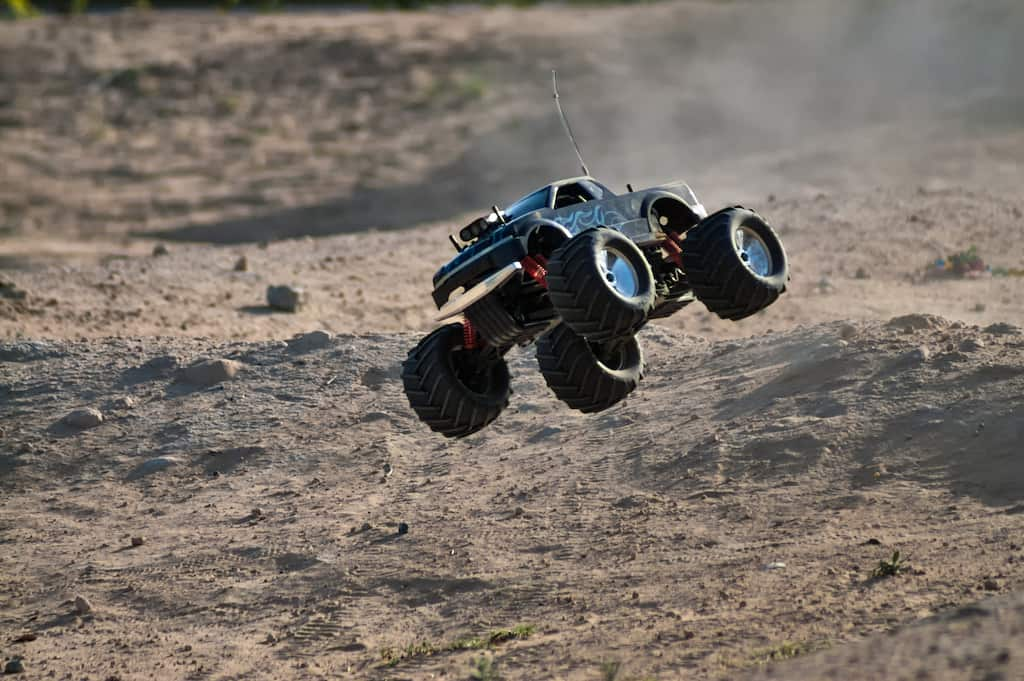
An On-road car (or street car) is made to drive on pavement and asphalt surfaces. They do not have big shocks and can’t hit large jumps. They are built to go as fast as possible and race on flat tracks.
The Arrma Vendetta is one of my favorite street cars and I proudly own the green version!
Street RC cars often look like real cars. You can buy kits that look like a Corvette, Mustang, drag racing car, or a formula one car.
This type of car category is for drivers who want their RC model to look like a real car or truck. Plus its lots of fun to drive an RC car at over 70 miles per hour!

Have you ever seen “Need For Speed: Tokyo Drift”? This movie is about race cars that slide sideways around every turn.
There is an entire class of RC cars that drift and slide on special indoor tracks.

RC Drift cars can be customized in a number of ways. You can adjust the motor, throttle response, and suspension to dial in your setup. Drift cars need an adjustable suspension, power output, and steering system depending on what type of track they are racing on.
This photo shows what a typical RC drift car may look like. RC Drift cars often have smooth tires and tight compact suspension.
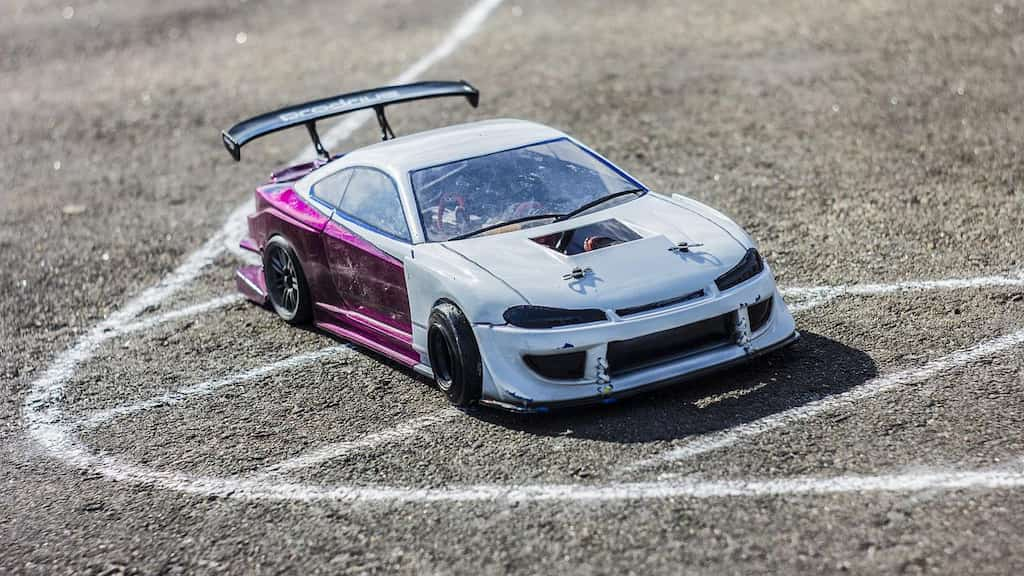
Rock crawlers are vehicles designed to climb and drive over very rough terrain. Rock crawling is an activity where the goal is to successfully navigate through a very bumpy and obstacle-ridden course.
Rock crawlers look like real cars and trucks, and many rock crawlers are modeled after jeeps.
These cars have a high center of gravity and use high-torque brushless motors.
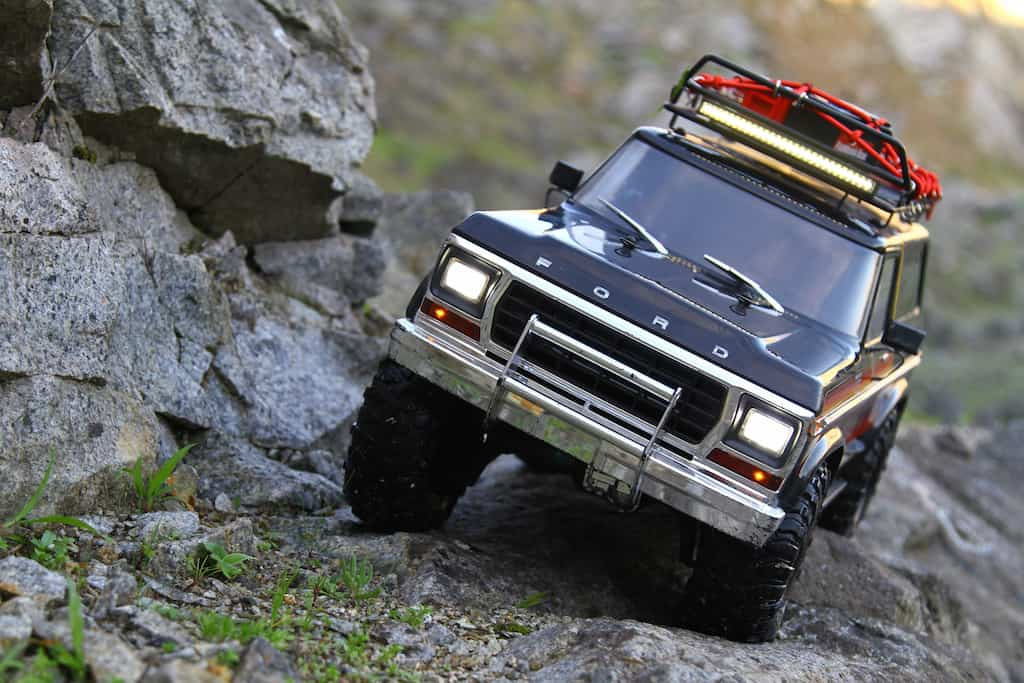
Owning RC cars require five key things:
The first thing you will learn about owning an RC car is everything takes time. Charging the battery, cleaning your car, replacing parts (and waiting on them to arrive in the mail), and practicing all take a fair amount of time.
The first thing you will learn about your new RC car battery is it will need charging before you drive it. The excitement you felt unboxing your new car will quickly vanish once you realize the battery did not come fully charged.
So, be prepared to read your battery instructions first and put the battery on the charger as soon as you get your new car home. You can multi-task and read all the other instructions while the battery charges.
It was much worse when I was a kid. A battery had to charge overnight, and it only lasted five minutes.
If you bought a nitro car, ignore that last bit. I applaud you for diving headfirst into RC cars by getting a nitro!
Battery manufacturers do not ship new battery packs fully charged, and a brand new battery may take an hour (maybe a bit more) to charge.
If you are running lipo batteries, you must carefully take care of the batteries and follow their charging instructions.
Learning how to properly charge, discharge, and store your battery will take time. But, you will be a battery charging pro after a few cycles through your vehicle.
Cars and trucks (especially four-wheel-drive vehicles) come with amazing features and have intricate parts that require maintenance. Some cars are waterproof, while others have high-tech GPS tracking systems.
Technology like the Traxxas Stability Management system requires drivers to research what the component does to the car. Many settings can be tweaked and adjusted to make your car perform to its maximum potential, but you have to take time to read the instruction manual to understand all the features.
I love reading about all the little settings each component has. I enjoy making minor adjustments and testing to see if the car performs better or worse.
If you live on a quiet street, you can make a few runs in front of your house without disturbing the neighbors. However, you will quickly want to explore new places to drive your car.
You may drive ten, fifteen, or even thirty minutes to a suitable place to run your car wide open.
Pick a good day where you have a couple of hours to yourself and find a good spot to drive your car.
Maybe you have a professional RC car track nearby?
If you want a good RC car to expect to pay around 300 dollars. However, You can find a beginner RC car for around 50 dollars.
An entry-level car at this price point won’t break any world speed records, but it will teach you all the basics about RC car ownership.
Costs only go up from the entry-level price point, and cars can cost thousands of dollars.
Or, you might want an entire fleet of cars specializing in different types of driving.
The answer to this question depends on what type of car you want. A rock crawler won’t need much space at all. You could drive it in your backyard and build an obstacle course made from wood, rocks, and other yard debris.
On the other hand, most race cars and trucks require open spaces. When your car can reach 60 miles per hour, you need plenty of room to run.
You also need to make sure you can safely operate the car away from other people. The last thing you want to do is hit someone or their car with your RC vehicle.
RC cars might be bigger than you expect. A Traxxas slash is over 23 inches long!
To properly work on and store your car, you need a workbench that you don’t mind getting dirty. You need to oil moving parts and blow off loose dirt and debris.
You can keep your batteries, chargers, tools, and lubricants on your workbench. As you gain more experience, you will want to replace worn-out parts or upgrade to higher-performance components.
I have worked on my car on the kitchen table once or twice. Trust me; you need a workbench.
I also recommend picking up a cheap RC car stand. I use a stand like the one below when working on my cars. It helps hold the up and can spin around easily. The magnetic parts tray is a nice plus since the screw on RC cars are very small!

In your RC car career, you will drive 30 minutes to your local RC track, hook up your battery, get three laps in, and crash.
Game over. Something broke.
You may or may not have all the tools or replacement parts to get your car up and running.
That is precisely why RC cars require patience.
You will go through a learning curve with every aspect of your car. Charging your batteries, changing parts, and learning to control the throttle takes practice and patience.
Absolutely! RC cars will make you feel like a kid again, and that feeling doesn’t wear off. At least not until your battery dies.
If you are in your thirties or forties and haven’t bought yourself a toy in a decade or two, an RC car will blow you away! You may be telling yourself, “well, I play video games,” but the truth is RC cars blow video games out of the water.
There is nothing like the first time you open up the throttle and watch your car take off like a rocket. You will say out loud, “this thing is faster than I thought. This is AWESOME!”
With RC cars, you get to:
RC cars are a hobby that spans all types of emotions. Whether you are taking is slow with a rock crawler, or flying through the air in your short course truck, there is an RC car for every type of personality.
I love RC cars because I think it is fun to build a car from scratch with a kit and tinker with them. Of course I love driving them most but I also get a lot of enjoyment working on them in my shop.
I hope this guide showed all the different parts of the hobby, how to get started, and some overlooked details about owning an RC car.
If you have any questions, please look over our other posts and guides. We want to help you make the best decision when it comes to buying, upgrading, driving, and maintaining your car!

John Williams has a deep understanding of RC car parts and vehicle maintenance. All articles, posts, and reviews and written based on his experience in the field of RC cars, RC helicopters, and RC planes. He posts videos on his YouTube channel that answer a variety of different RC maintenance questions. He also loves to share his passion for RC cars with his family and nephews!